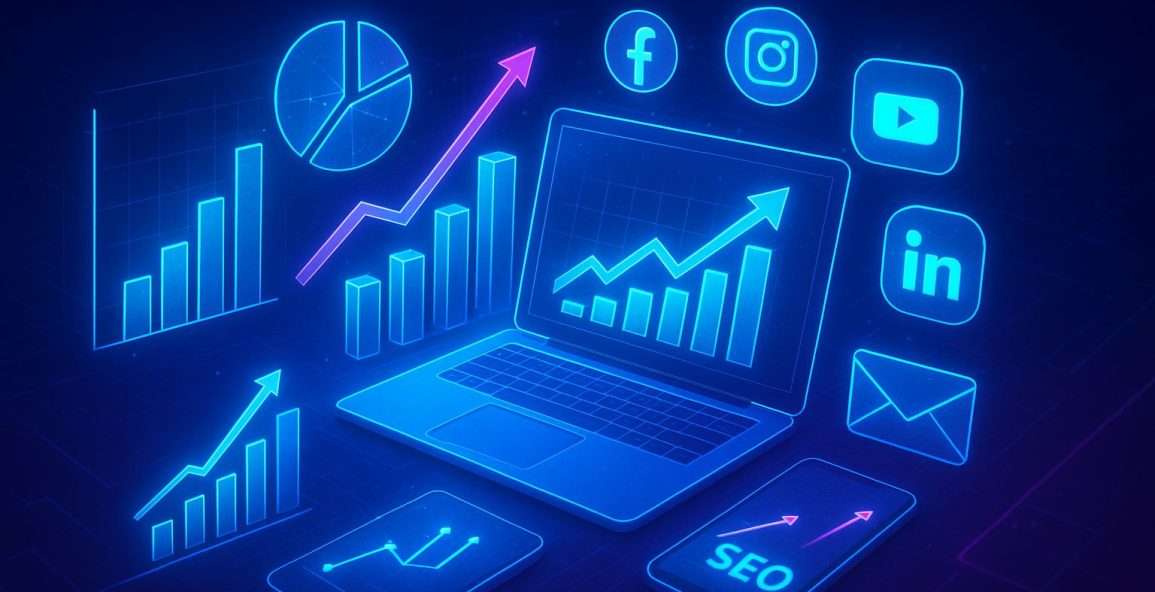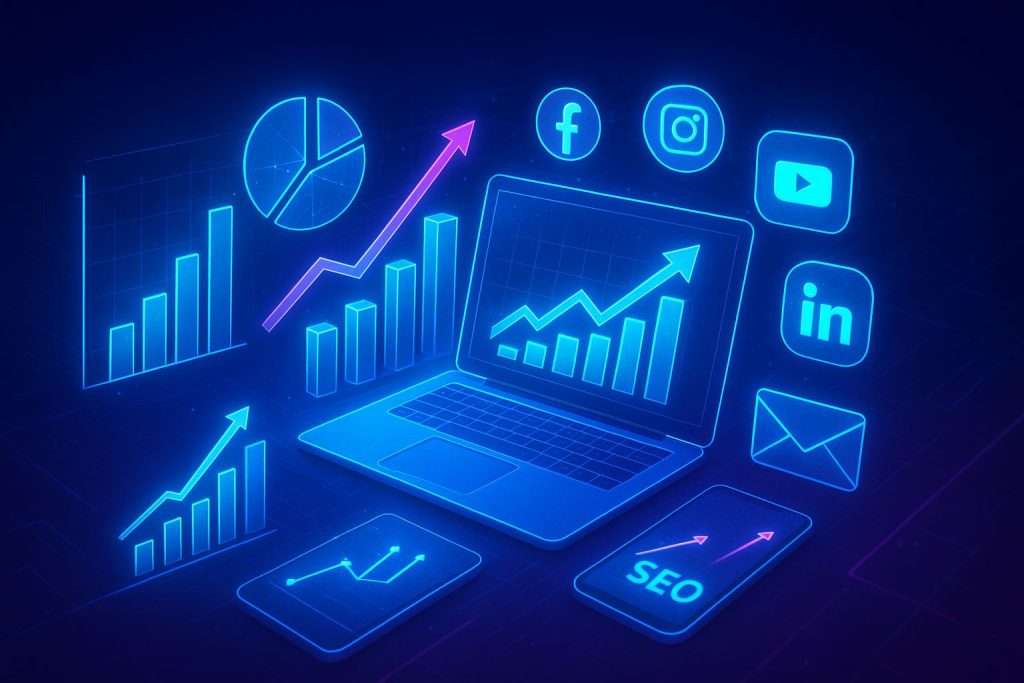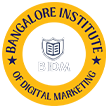
In today’s fast-paced, technology-driven world, businesses cannot rely solely on traditional marketing methods.
With over 5 billion people using the internet globally, digital marketing has become a cornerstone for brands to reach, engage, and convert their target audience.
Digital marketing refers to the promotion of products, services, or brands using digital channels such as search engines, social media, email, websites, and mobile apps.
Unlike traditional marketing, digital marketing allows businesses to measure results in real-time, personalize campaigns, and optimize strategies based on data.
The evolution of digital marketing has transformed how businesses interact with customers, providing unprecedented opportunities for growth, brand visibility, and revenue generation.
Table of Contents
Understanding the Core of What is Digital Marketing
Traditional Marketing vs. Digital Marketing
Traditional marketing relies on offline methods like print ads, TV, radio, and billboards. While these methods still hold value, they often lack precise targeting, real-time tracking, and measurable ROI.
Digital marketing, on the other hand, uses online channels to reach audiences where they spend most of their time.
It is data-driven, interactive, and allows businesses to adapt strategies quickly for maximum results.
How Digital Marketing Works
Digital marketing works by connecting brands to their target audience through multiple online touchpoints.
Businesses collect data from website visits, clicks, social media interactions, and email engagement to optimize campaigns.
This allows for hyper-targeted marketing, where messages are tailored to individual customer preferences.
Key Components of Digital Marketing
- Channels – Platforms like Google, Facebook, Instagram, YouTube, LinkedIn, and email.
- Content – Blogs, videos, infographics, podcasts, and social media posts.
- Analytics – Tools to track performance, engagement, and ROI.
- Audience Targeting – Segmentation based on demographics, behavior, and interests.

Major Types of Digital Marketing
a) Search Engine Optimization (SEO)
SEO is the process of optimizing a website to rank higher on search engine results pages (SERPs). The goal is to attract organic traffic from users searching for relevant queries.
- On-page SEO: Optimizing titles, meta descriptions, headings, images, and content.
- Off-page SEO: Link building, guest posting, and influencer outreach.
- Technical SEO: Site speed, mobile-friendliness, structured data, and crawlability.
b) Pay-Per-Click Advertising (PPC)
PPC campaigns allow businesses to display ads on search engines or social media platforms and pay only when users click on the ad. Google Ads and Facebook Ads are the most popular PPC platforms.
c) Content Marketing
Content marketing focuses on creating valuable, informative, and engaging content to attract and retain an audience. Formats include blogs, videos, infographics, podcasts, and eBooks.
d) Social Media Marketing
Social media marketing uses platforms like Facebook, Instagram, LinkedIn, Twitter, and TikTok to build brand awareness, engage audiences, and drive conversions.
e) Email Marketing
Email marketing remains one of the most effective ways to nurture leads and maintain customer relationships. Automated campaigns, newsletters, and personalized offers are commonly used strategies.
f) Influencer Marketing
Brands collaborate with influencers to promote products or services to their followers. Influencer marketing leverages trust and credibility built by individuals on social media.
g) Affiliate Marketing
Affiliate marketing allows businesses to partner with affiliates who promote products in exchange for a commission for every sale or lead generated.
h) Video Marketing
Video marketing uses platforms like YouTube, Instagram Reels, and TikTok to communicate brand stories, demonstrate products, and engage audiences visually.
i) Mobile Marketing
Mobile marketing targets users on smartphones and tablets through apps, SMS, push notifications, and location-based advertising.
Importance and Benefits of Digital Marketing
- Cost-Effective – Digital campaigns are often cheaper than traditional media.
- Global Reach – Businesses can connect with audiences worldwide.
- Real-Time Analytics – Immediate insights allow data-driven decisions.
- Personalization – Marketing messages can be tailored for individuals.
- Higher ROI – Optimized campaigns generate better returns on investment.
- Customer Engagement – Brands can interact directly with customers.
Digital Marketing Strategies for Businesses
Step 1: Define Your Goals
Identify whether your goal is brand awareness, lead generation, sales, or customer retention.
Step 2: Identify Your Target Audience
Create detailed buyer personas including demographics, interests, and pain points.
Step 3: Choose the Right Channels
Select platforms where your audience spends most of their time.
Step 4: Create Engaging Content
Develop content that informs, entertains, or solves problems for your audience.
Step 5: Monitor, Measure, and Optimize
Use analytics tools to track KPIs and optimize campaigns for better results.
Funnel Stages in Digital Marketing
- Awareness: SEO, social media, blogs
- Consideration: Email campaigns, retargeting ads
- Conversion: Landing pages, offers, promotions
- Retention: Customer loyalty programs, newsletters
Tools & Technologies Used in Digital Marketing
- SEO Tools: Google Search Console, SEMrush, Ahrefs
- Social Media Tools: Hootsuite, Buffer, Sprout Social
- Email Marketing Tools: Mailchimp, HubSpot, SendinBlue
- Analytics Tools: Google Analytics, Hotjar, Kissmetrics
- Design Tools: Canva, Adobe Creative Suite
Career in Digital Marketing
Scope in India and Globally
Digital marketing careers are booming. From SEO specialists to content strategists, the demand is high due to digital transformation across industries.
Key Roles
- Digital Marketing Manager
- SEO Specialist
- Social Media Manager
- PPC Specialist
- Content Writer/Strategist
- Email Marketing Specialist
- Analytics Expert
Salary Insights
In India, freshers earn around ₹3–5 LPA, while experienced professionals can earn ₹10–25 LPA. Globally, digital marketers can earn $50,000–$120,000 annually depending on role and expertise.
Skills Required
- SEO & SEM
- Social media management
- Content creation
- Analytics and data interpretation
- Paid advertising expertise
- Email marketing and automation
Future Trends in Digital Marketing (2025 & Beyond)
- AI & Automation: Chatbots, AI content, predictive analytics.
- Voice Search Optimization: Optimizing for voice-activated devices.
- Personalization: Hyper-targeted campaigns based on user behavior.
- Video-First Marketing: Short-form videos dominate social media.
- Data Privacy & Ethics: Compliance with GDPR, CCPA, and local laws.
- AR & VR Marketing: Immersive experiences for customers.
Common Myths About Digital Marketing
- Myth 1: It’s only for big companies. → Small businesses benefit hugely.
- Myth 2: Social media marketing is free. → Paid ads are often required for scale.
- Myth 3: Email marketing is dead. → It still has one of the highest ROI.
- Myth 4: SEO results are instant. → SEO requires consistent effort over time.
How Small Businesses Can Leverage Digital Marketing
- Start with social media and local SEO.
- Use email marketing for customer retention.
- Run affordable PPC campaigns on Google & Facebook.
- Share valuable content to build authority.
- Analyze performance regularly to optimize campaigns.
Case Study:
A small bakery in Delhi increased online orders by 200% in 6 months by running Instagram ads, optimizing local SEO, and sending weekly email newsletters.
Challenges in Digital Marketing
- Algorithm changes on Google and social media
- Ad fatigue among audiences
- Increasing competition for attention
- Data privacy regulations and compliance
- Maintaining consistent content quality
Final Thoughts / Conclusion
Digital marketing is no longer optional — it’s essential. From global corporations to small local businesses, leveraging digital channels ensures visibility, growth, and customer engagement.
Whether you’re a business owner, student, or aspiring marketer, understanding and implementing digital marketing strategies is key to staying competitive in 2025 and beyond.
Start small, experiment, measure, and optimize — the digital world rewards consistency and creativity.
FAQs (SEO Optimized)
Q1: What are the 7 types of digital marketing?
A: SEO, PPC, content marketing, social media marketing, email marketing, influencer marketing, and affiliate marketing.
Q2: Which is the best career in digital marketing?
A: Careers in SEO, PPC, content strategy, social media management, and analytics are highly in demand.
Q3: How do beginners start in digital marketing?
A: Start with learning SEO, social media marketing, and content creation. Take online courses, practice with small projects, and build a portfolio.
Q4: What is the future of digital marketing in India?
A: The future is bright — AI, automation, video marketing, and personalized campaigns will drive growth for businesses.
Q5: Is digital marketing a good career in 2025?
A: Absolutely — it’s one of the fastest-growing industries with high demand, competitive salaries, and opportunities worldwide.



